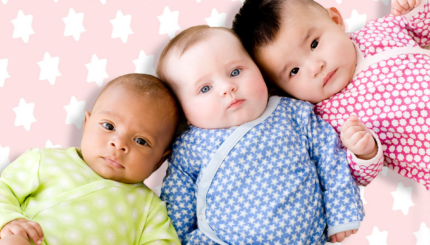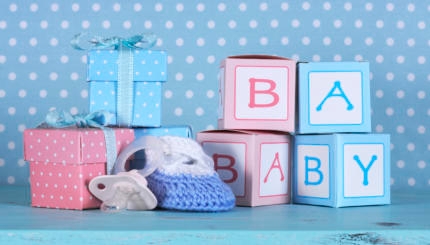When my husband and I first learned that we were expecting a baby, we spontaneously decided to say the Shehechiyanu blessing over the pregnancy test. Awkwardly holding the purple plastic wand in front of us, we struggled against giggling and crying as we gave thanks to God for sustaining us and bringing us to that day. It seemed right to celebrate the moment with prayer — even over such an unlikely “ritual object” — and this marked the beginning of nine months of figuring out how to make my pregnancy more Jewishly meaningful.
For more on Jewish parenting and pregnancy, visit our partner site Kveller.
First I set out to find Jewish sources about how to have a traditional pregnancy and birth experience. This seemed appropriate, since I had a fairly traditional Jewish wedding, and as an adult I have enjoyed discovering Jewish prayers, blessings, and rituals that can punctuate my daily life.
So I felt rather disappointed — well, actually, kind of cheated — when I found almost nothing in our tradition to guide an expecting mother. I discovered that those Talmudic rabbis who discussed, debated, and opined about what part of the field to harvest first, and when a woman was ritually pure enough to have sex with her husband, had very little to say about how to carry a child for nine months.
With your help, My Jewish Learning can provide endless opportunities for learning, connection and discovery.
Perhaps this is because the sages were never pregnant. As Sandy Falk and Rabbi Daniel Judson write in The Jewish Pregnancy Book ( 2004): “the Talmudic Rabbis, who formulated the basis of traditional Jewish prayer, ritual and law, were men, so they never experienced pregnancy. As a result, there are a dearth of prayers, rituals and blessings that Judaism has for pregnancy and delivery.”
The challenge, therefore, was my own. In the ultimate creative time, as I nurtured the growth and completion of another being, I also had the opportunity to be creative with Jewish practice.
Personal Practices
Over the centuries, Jewish women like me have whipped up a wonderful buffet of pregnancy observances, many uniquely created for and by individuals. Going to the mikveh, chanting psalms, reading poems, lighting candles and gathering friends together to share stories of birth and motherhood are some of the ways that women have sought to amplify the spiritual experience of pregnancy.
For me, a modern translation of Psalm 118 formed the basis for my personal pregnancy ritual. I regularly recited these words, liberally translated by a friend: “Open up the gates of justice, sing a song to life, give tzedakah (do good works, be generous) and walk the path of freedom.” This helped me focus on the work of “opening up” and creating space for new life throughout pregnancy.
I also found that giving tzedakah helped me stay grounded and grateful for my healthy pregnancy. Prior to conception, I had donated blood, and as my waistband expanded, I researched and donated money to organizations promoting maternal and neonatal health around the world.
Superstitious Traditions
Like a lot of couples, my husband and I felt conflicted about when to let our friends and family know our good news. I was so overjoyed that I couldn’t wait to tell, and even considered updating my Facebook status immediately, but my husband wanted to wait 40 days before telling our family and friends. Why that long? The Talmud states that at 40 days after conception, the embryo finally forms into a fetus (Niddah 30a). Whether or not the fetus receives its soul at this point was debated in the Talmud and the Mishnah, but having the 40-day guideline worked for us.
When we did finally announce the pregnancy, we noticed that we didn’t receive the joyous response of “mazel tov!” that we anticipated from Jewish friends. Rather, we heard people say, time after time, “b’sha-ah tova!” This literally means “in a good hour,” and expresses the impermanence of pregnancy and the potential for loss — in other words, “May your child be born at the right time.” It did seem a bit superstitious to me, but many of the Jewish traditions surrounding pregnancy seem to come from an impulse to protect the parents from disappointment and grief should there be a birth complication or miscarriage.
I was told that many Jews don’t throw baby showers or buy the baby’s clothing or furniture before birth. Not feeling particularly anxious, but also not wanting to go against custom (you never know!), I decided to collect just a small box of baby items and wait until I was nearly due before getting fully equipped.
As we prepared for our transition to parenthood, my husband and I helped one another memorize the priestly blessing, which has became the traditional blessing for parents to give their children: “May God bless you and keep you; May God make His face shine upon you and be gracious to you; May God lift up His countenance and give you peace.” We chanted it over my bulging belly so that our baby would feel comforted by it when she heard it again on her first Shabbat.
Baby Blinders
During these nine months, I felt like I was wearing pregnancy-colored glasses. Hyper-alert to other expecting mothers, and super-attuned to any babies nearby, I was always seeking out allies in my journey to motherhood. As I observed Jewish holidays, I found myself re-interpreting biblical stories to fit my particular viewpoint.
With new appreciation, I relished the part of the Passover seder that describes when Pharaoh ordered the firstborn Hebrew babies killed. My new feminist heroines, the midwives Shifra and Puah, valiantly defied Pharaoh by helping to deliver and protect Hebrew children (who, encouragingly, came out very fast because of the innate strength of Hebrew women). I resolved to imagine Shifra and Puah on my right and left side during labor.
I also couldn’t help reframing the Exodus as the “birthing” of the Jewish people, who passed from the constricted, difficult Egypt through the birth canal of the Sea of Reeds and landed in the vast expanse before the Promised Land. I was hoping that I could bring that vision of the Red Sea to my labor and imagine my baby passing through easily, following Moses into the world.
Of course, some biblical stories were not as affirming to this pre-mama. I was reluctant to revisit the Genesis story that blames the pain of labor on Eve’s transgression in the garden of Eden. After the serpent entices her to eat the forbidden fruit, God says to her, “I will make most severe your pangs in childbirth; in pain you shall bear children” (Gen 3:16). What punishment! I decided to reject this passage and instead honor my birth as a huge gift and not a primordial payback.
I knew it wouldn’t be a comfortable experience, but I wanted to see the pain instead as an invitation to connect back through the ancestral line of mothers that started with our matriarchs Sarah, Rebecca, Rachel, and Leah, each of whom experienced this miracle of birth in her own, creative way.
seder
Pronounced: SAY-der, Origin: Hebrew, literally "order"; usually used to describe the ceremonial meal and telling of the Passover story on the first two nights of Passover. (In Israel, Jews have a seder only on the first night of Passover.)
Talmud
Pronounced: TALL-mud, Origin: Hebrew, the set of teachings and commentaries on the Torah that form the basis for Jewish law. Comprised of the Mishnah and the Gemara, it contains the opinions of thousands of rabbis from different periods in Jewish history.
tzedakah
Pronounced: tzuh-DAH-kuh, Origin: Hebrew, from the Hebrew root for justice, charitable giving.
Shehechiyanu
Pronounced: sheh-hekh-ee-YAH-new, Origin: Hebrew, a blessing said upon experiencing a new or special occasion.
mazel tov
Pronounced: MAHZ-ul tahv or mah-ZAHL tove, Alternate Spelling: mazal tov, Origin: Hebrew, literally "good luck," but usually used to mean "congratulations."



